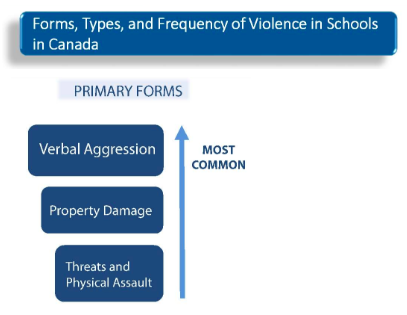National report finds teachers increasingly experience violence in schools
According to a recent study by the Canadian Teachers’ Federation (CTF), more than 70% of teachers across Canada are seeing an increase in both the rate and severity of violence in schools. The study reviewed existing publications on the topic, media reports, and survey findings from five CTF member organizations, which included over 40,000 teacher respondents.
The kinds of violence educators face include verbal aggression, property damage, threats, and physical assault. Non-physical (verbal/emotional) violence is most commonly experienced by educators, followed by physical violence. The survey results found that between 41% and 90% of teachers (depending on their province) report having experienced violence at some point in their careers.
 Higher rates of violence are reported by women, teachers who work in elementary schools, special education teachers, and teachers who work in schools with lower socioeconomic status and/or large urban areas. According to the report, many teachers are unlikely to report the violence to administrators and police, either due to concerns about job insecurity, concern for student well-being, or lack of knowledge about reporting procedures/policies.
Higher rates of violence are reported by women, teachers who work in elementary schools, special education teachers, and teachers who work in schools with lower socioeconomic status and/or large urban areas. According to the report, many teachers are unlikely to report the violence to administrators and police, either due to concerns about job insecurity, concern for student well-being, or lack of knowledge about reporting procedures/policies.
At the release of the report CTF President Mark Ramsankar attributed the rise in violence to increasingly complex classrooms, which require more support and resources, including assistants, psychologists, and psychiatrists. According to Ramsankar, when a child’s social and emotional needs are not met, it can lead to violent outbursts. However, insufficient funding can result in limited access to in-service supports and training for teachers, and inadequate resources for students with mental health, behavioural, and special education needs.
Principals report increasing challenges in supporting students’ mental health needs
The CTF report mirrors some of the findings from People for Education’s 2018 annual report. One of the most urgent issues identified by principals in Ontario is students’ increasing mental health needs and behavioural issues. Principals report mental health issues take up an increasing amount of their time, and say that schools have inadequate access to supports as social workers, psychologists, and guidance counsellors (in 2017, 47% of Ontario elementary schools reported having no access to child and youth workers, 15% did not have access to social workers, and 13% did not have access to psychologists).
Vital to embed social-emotional and health competencies in curriculum
The CTF study also provides support for People for Education’s call to embed vital social-emotional and health competencies in students’ learning. Students’ mental health has a direct impact on their education and their long term success. It is crucial to recognize social-emotional learning and mental health as the new basics for public education, requiring policy, curriculum, resources, and professional supports.
Read more here.
